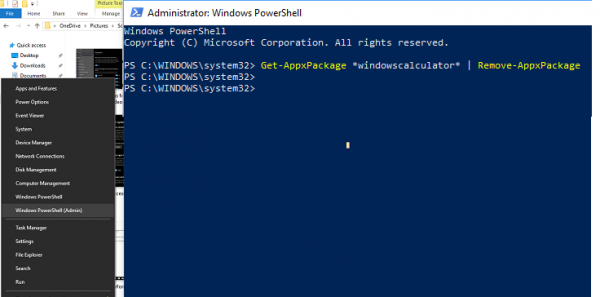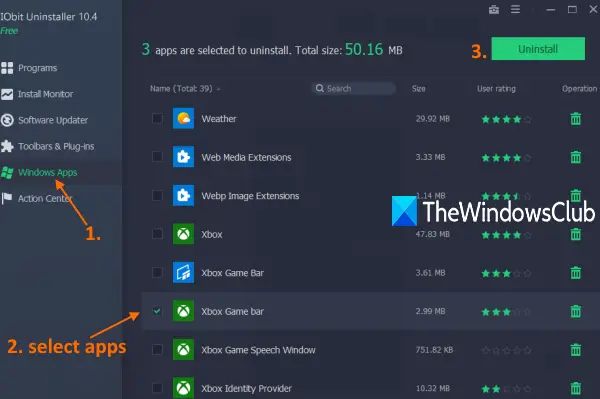Windows 11 and Windows 10 with pre-installed apps. Some apps are essential for consumers, while others are installed from an advertisement perspective. There are multiple reasons why Microsoft adds apps even when you upgrade from one version to another – but it can be removed. So if you have this question: What Windows apps can I uninstall – then, in this guide, we will show you how to remove built-in Microsoft Store apps using a readymade PowerShell Script from TechNet Gallery. While there are several ways you can uninstall apps in Windows, today, we will take a look at this PowerShell script.
Microsoft sells Windows to Enterprise as well, and there is no place for any pre-installed apps. The company’s policies restrict them, and only the approved apps are allowed to be installed and available.
Remove built-in Microsoft Store Apps using PowerShell or Windows Terminal
Both of these instructions work perfectly, but there are some drawbacks. Some of the apps like Cortana, Edge, etc. cannot be removed as they are essential for the complete experience. Also, the first method might leave some broken links on the start menu.
- Remove the apps from the ISO file
- Uninstalling Apps post-Windows installation
- IObit Uninstaller
While the last one is not a script, but you can use it to uninstall the built-in apps.
1] Remove the apps from the ISO file
This solution works on Windows 11/10 machines, where you are going to install it fresh. We will have to remove the apps from the ISO file and install them, so none of them get installed firsthand.
This PowerShell script takes a simple list of Apps and then removes the Apps from the default install.wim. Afterward, the WIM image can be used for distribution with Configuration Manager or similar solutions. When the script starts, WIM-Image is automatically mounted to a temporary directory. Afterward, all preinstalled apps are read out and subsequently uninstalled.
Note: This method is only for power users who understand the level of technicality.
Example Commands:
.\removeapps.ps1 -pathtowim c:\10\install.wim .\removeapps.ps1 -pathtowim c:\10\install.wim -selectapps $true .\removeapps.ps1 -pathtowim c:\10\install.wim -select $true -index 2
There is one significant drawback, though. Post OS installation, or whenever you add a new user, the start menu will be full of invalid shortcuts with just the name of the removed app in the square. It will look like “P~Microsoft.SkypeApp_kzf8qxf38zg5c!App”. This bug is yet to be answered, but it’s there and is annoying.
You can download the PowerShell script from TechNet Gallery.
2] Uninstalling Apps post-Windows 11/10 installation
If you just thought that uninstall option is good enough, it doesn’t let you easily remove a few of the most important built-in apps.
To get this sorted, we will have to use PowerShell or Windows Terminal with an administrator account. Follow the steps below:
- Use Windows+X and choose the “Windows PowerShell (Admin)” option from the Power User menu.
- After an interactive confirm dialogue, PowerShell will complete permission will load up.
- Next, copy-paste one of the following commands, and hit return.
- Post this, the app will be uninstalled, and it will uninstall for all the users.
- You may have to install the app again from the store.

Uninstall Calculator:
Get-AppxPackage *windowscalculator* | Remove-AppxPackage
Uninstall 3D Builder:
Get-AppxPackage *3dbuilder* | Remove-AppxPackage
Uninstall Calendar and Mail:
Get-AppxPackage *windowscommunicationsapps* | Remove-AppxPackage
Uninstall Alarms and Clock:
Get-AppxPackage *windowsalarms* | Remove-AppxPackage
Uninstall Camera:
Get-AppxPackage *windowscamera* | Remove-AppxPackage
Uninstall Get Office:
Get-AppxPackage *officehub* | Remove-AppxPackage
Uninstall Get Started:
Get-AppxPackage *getstarted* | Remove-AppxPackage
Uninstall Get Skype:
Get-AppxPackage *skypeapp* | Remove-AppxPackage
Uninstall Groove Music:
Get-AppxPackage *zunemusic* | Remove-AppxPackage
Uninstall Maps:
Get-AppxPackage *windowsmaps* | Remove-AppxPackage
Uninstall Microsoft Solitaire Collection:
Get-AppxPackage *solitairecollection* | Remove-AppxPackage
Uninstall Money:
Get-AppxPackage *bingfinance* | Remove-AppxPackage
Uninstall Movies & TV:
Get-AppxPackage *zunevideo* | Remove-AppxPackage
Uninstall News:
Get-AppxPackage *bingnews* | Remove-AppxPackage
Uninstall OneNote:
Get-AppxPackage *onenote* | Remove-AppxPackage
Uninstall People:
Get-AppxPackage *people* | Remove-AppxPackage
Uninstall Phone Companion:
Get-AppxPackage *windowsphone* | Remove-AppxPackage
Uninstall Photos:
Get-AppxPackage *photos* | Remove-AppxPackage
Uninstall Sports:
Get-AppxPackage *bingsports* | Remove-AppxPackage
Uninstall Store:
Get-AppxPackage *windowsstore* | Remove-AppxPackage
Uninstall Voice Recorder:
Get-AppxPackage *soundrecorder* | Remove-AppxPackage
Uninstall Weather:
Get-AppxPackage *bingweather* | Remove-AppxPackage
Uninstall Xbox:
Get-AppxPackage *xboxapp* | Remove-AppxPackage
The good thing is that even if you remove Built-in apps from Windows using PowerShell, they can always be installed back from the store. Unlike Windows 7, Windows 11/10 offers Microsoft Store, which is a central place to install and update all the apps on your PC.
Read: How to open Microsoft Store apps from Command Prompt.
3] IObit Uninstaller

If you need to uninstall programs or apps in bulk, you can use the IObit Uninstaller to remove the regular apps or the apps which you downloaded from the store or came preinstalled. It will also remove any leftovers. Check out our detailed guide on how to use it.
What apps should I remove from my PC?
If you have any app which came preinstalled on the PC when you bought it, you don’t use it can be uninstalled. It includes apps such as PC cleaners, toolbars, extensions, and any program you feel is bloatware and has been installed as part of the OEM deal. You can always reinstall the apps if you think you need them back.
How do I manually uninstall Microsoft Store apps?
Go to Settings > Apps > Apps and features. Here you can see a list of all the apps that are installed on your PC. Locate the one you want to uninstall, click on the three-dot menu, and choose to uninstall it. You can also search for the app using the app search box.